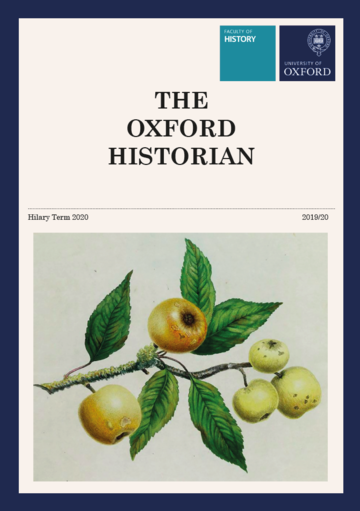The Oxford Historian: Issue XVII (2019-20)
Happy new year to you all, and welcome to another edition of the Oxford Historian. It is day three of 2020 as I write this, and the morning news is dominated by two stories – the assassination of the Iranian General, Qasem Soleimani, by an American drone, and Dominic Cummings’s call for new kinds of people to come and work in Number 10. Both stories strike chords. Soleimani was the subject of a Prospect article in October which I happened to read (https://www.prospectmagazine.co.uk/magazine/iran-us-uk-relations-qasem-soleimani). It presented him as the key figure in the promotion of Iranian regional interests, but not as a revolutionary, nor a villainous sponsor of terrorism (though certainly attempting to use and manage terrorist groups). In a violent conflict of over-extended powers, his motives and actions were at least comprehensible and rational: it remains to be seen what will come of this highly individualised intervention from the US.
Cummings’s move was another disruptive intervention – this time in the rather smaller pool of British politics (https://dominiccummings.com/). It reminded me of Sir John Fortescue’s call for a new kind of council to advise the king in 1470 – not experienced prelates, great lords and their supporters, but persons of talent and learning ‘of the best and wisest of the land’. Cummings, like Fortescue, might be seen as a quintessential ‘evil councillor’ – a bright person with few friends and allies who can be catapulted into high places to do controversial things (and can be quickly removed by the ruler if the political push-back grows too strong). His proposals make tough reading for a History Faculty – the civil servants he wants are mathematicians, physicists, economists; people alert to the latest forecasting models, AI-driven packages and so on; not the humane, rounded, discerning individuals we hope we have been helping into the profession – and yet they are also alert to something that every historian must respect: the need for human institutions continually to adapt to changing circumstances, whether these are climatic, economic, technological or indeed cultural.
What strikes me about both these episodes is the turn away from the reasonable, the predictable, the modestly progressive – and towards the trenchant, the risky, the revolutionary. We all know enough history to know that there are times when one of these great patterns gives way to the other – there is nothing fixed about the hegemony of either, and each has its costs and benefits. Times of transition are difficult and unsettling for us as citizens, but they are also interesting for us as historians.
Here in the Faculty, we experience our own smaller-scale mixture of continuity and change. This is the term of the big lecture series – the Fords on Friday evenings at 5.00 (https://www.history.ox.ac.uk/james-ford-lectures-british-history); the Carlyles on Tuesdays (https://www.history.ox.ac.uk/carlyle-lectures) and the Slades on Wednesdays (https://www.history.ox.ac.uk/slade-lectures) – you are all most welcome to attend. We are also deep in preparation for the current ‘Research Excellence Framework’ which will determine a large slice of our income for the six or seven years from 2021. These things come round at regular intervals.
But there are new things too. In September, we learned that our application for the bronze Athena SWAN award had been successful, and this means that we have been recognised by ‘Advance HE’ as trying to address historic inequalities facing women in the Faculty and have come up with a plan of action that should deliver a better future. In November, we launched a ‘community history’ initiative, to start thinking about how we, as a Faculty, might work more effectively with historians and community groups based here in Oxford. In February, we shall hold our first joint event with the Oxford Foundry, a hub within the university to support budding entrepreneurs. And in the spring and summer, finally, we shall be holding new kinds of alumni events. In place of the dinner, which has been attracting smaller numbers in recent years, we plan to hold two one-day events, one geared to alumni with shared professional interests (we plan to invite those of you who are teachers in 2020) and another focused on groups from particular decades (we thought 1990s for the present year, and a programme of talks and receptions focused on the history of that time, though we shall also be inviting anyone else who wants to come: watch this space). In all, then, there is much to look forward to as we start the new year, and I wish you a happy and fulfilling 2020.




